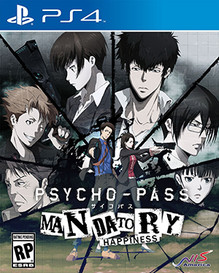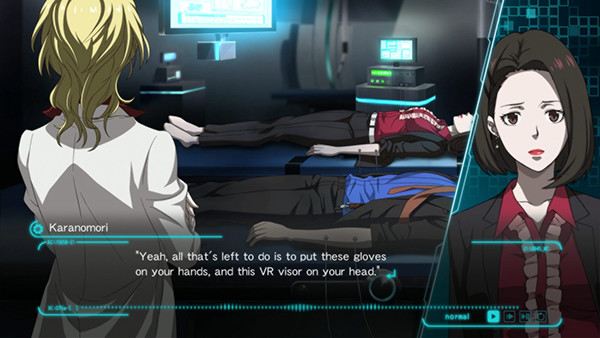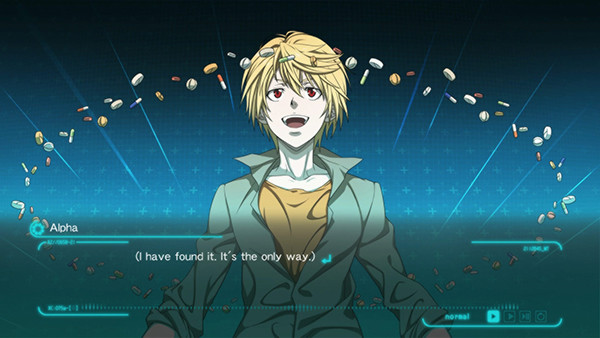Game Review
by Dustin Bailey,Psycho-Pass: Mandatory Happiness
PlayStation 4, PlayStation Vita
| Description: |  |
||
As a rookie inspector assigned to work with Unit One of the Public Safety Bureau's Criminal Investigation Division, Psycho-Pass: Mandatory Happiness has you tracking down latent criminals before their crimes can be committed. But when a cyborg body goes missing and a mysterious name keeps finding its way into your investigations, you'll find yourself in the middle of something far bigger than you expected in this visual novel spinoff. |
|||
| Review: | |||
In the future, superpowered AI monitor human psychological states, measuring their likelihood of committing criminal acts and meting out proactive justice to prevent those crimes from happening. Enforcers, directed and monitored by their mentally stable inspectors, are dispatched to scenes of psychological volatility and charged with subduing latent criminals before those situations escalate to actual crime. This was the setting of 2012's cyberpunk anime series, Psycho-Pass, and now it's the backdrop for a visual novel adaptation in Psycho-Pass: Mandatory Happiness. Taking place early in the show's first season, the game tells a new story featuring a handful of new characters working with and against the core cast of familiar investigators. On the side of the law is Nadeshiko Kugatachi, a no-nonsense inspector with zero patience for emotional outbursts and a case of missing memories. Takuma Tsurugi plays the part of the headstrong enforcer, impetuous but bearing a heart of gold. You'll choose one of these characters at the start of the game and view the story from their perspective, and while they've both got quirks and foibles, it's tough to escape the feeling that they exist primarily for players to insert themselves into the setting and hang out with the core inspection team. It's a problem inherent to telling a story inside a much larger existing plot, since none of the original cast can undergo a full character arc in this game, but it takes a little extra suspension of disbelief not to wonder why Tsurugi and Kugatachi are never remembered or heard from again.
 The remainder of the original characters for this game are latent criminals and their victims. The cases build well on the dark, psychological drama that the show is known for, building plots around some very grim topics. How grim those stories become will depend on how well you respond to the prompts that branch the plot, as a bloodbath on one branch might resolve into a nearly happy ending on another. Branching paths in a visual novel certainly isn't a new concept, but the way you're cast in the role of detective makes the choices feel more immediate and impactful than they might otherwise. Which leads you follow up on, who you question, and how you respond to intense situations all have an effect not just on how the individual cases play out, but the status of your character's psyche. You'll have to monitor your own Psycho-Pass and avoid a clouded hue throughout the game, and failing to take the appropriate mental supplements or attend counseling sessions after high-stress encounters will have coworkers questioning your fitness and eventually leave you stuck at the office when important events start going down. The first two cases essentially stand on their own. The first features a story of teenage longing gone wrong, with a would-be boyfriend abducting a reluctant partner, forcing you to retrace their relationship to determine where he's taken her. The second features a young mother with a desperate desire for perfection, leading to abuse when she's unable to keep her infant child from tears. These parts of the story result in a Slow Start, offering a decent but not spectacular take on dark sci-fi procedural.
 But then things spin off into a battle with a villain who raises the stakes from personal to nearly apocalyptic. A central antagonist pulling the strings behind seemingly unrelated crimes has already been explored as a concept in the anime, but the motivations of that antagonist, the details of his plot, and his relationship to Tsurugi and Kugatachi all ensure that it doesn't feel like a rehash. The final chapter, which takes up over half of the story's runtime, does a terrific job of ratcheting up the tension and providing the conflict necessary for the new protagonists to finally come into their own. You'll start dealing with large-scale crisis management and confront the questions that pushed the villain toward his malevolent ways. It's pulpy and never hits quite as high as its questions about the nature of happiness seem to be aiming, but it's a fun story with an exciting climax. Mandatory Happiness is a very Short Game. Depending on your reading speed, it's unlikely that an initial playthrough will take more than five or six hours to see to completion. Naturally, you can extend that playtime by revisiting the story as the other character, making different choices and finding different endings. A large part of the game's appeal comes from seeing the plot as different perspectives with different details. But there's no escaping the fact that you'll be revisiting the same events over and over to squeeze more than an afternoon out of the game.
 Voice samples and concept art can be unlocked through a minigame accessed through the main menu, which has you matching numbered tiles together to help a chibi inspector Akane catch a runaway crook. Putting a pair of twos together makes a four, two fours make an eight, and so on to higher value tiles. The strategy lies in combining tiles while leaving yourself room to continue shifting them around. It's incredibly similar to a mobile game called Threes, and while this iteration is still entertaining, its place in this package borders on nonsensical. Why is all the extra content locked behind a minigame with no connection to the remainder of the game? Mandatory Happiness is easiest to recommend for the most hardcore Psycho-Pass fans, those who've exhausted every episode and are still desperate for more. The core story goes in interesting directions, builds high stakes for its characters, and raises some fascinating questions about the nature of happiness. But with a Slow Start, a short running time, and a pair of fairly rote protagonists, this visual novel struggles to go beyond being an entertaining reunion with the show's cast. |
|
The views and opinions expressed in this article are solely those of the author(s) and do not necessarily represent the views of Anime News Network, its employees, owners, or sponsors.
|
| Grade: | |||
Overall : C+
Graphics : C
Sound/Music : B-
Gameplay : C
Presentation : B-
+ Detective work makes VN choices feel more meaningful, and the latter half of the story is a fun, fast-paced philosophical adventure |
|||
| discuss this in the forum (6 posts) | | |||